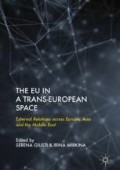Abstract
Energy constitutes a crucial matter for both the EU countries and the states in the European neighborhood. Notwithstanding the exceptional effort in decarbonizing and in fostering renewable energies, EU countries still depend on imports of hydrocarbons from extra-EU countries. This dependence has deep implications both in terms of security of supply for member states and in terms of price paid for energy by end consumers. Starting from an assessment of the drivers of demand, supply and prices, the chapter will examine the role of geopolitical issues in shaping the energy sector by considering two broad case studies: the relations of the EU with its main natural gas supplier, Russia, and with the world’s main oil suppliers, countries in the Middle East.
The contents, views and opinions expressed in the text belong solely to the author, and do not necessarily reflect the official policy or position of any of the author’s employers or organisations.
Access this chapter
Tax calculation will be finalised at checkout
Purchases are for personal use only
Notes
- 1.
See BP Energy Outlook (2017) and OECD (2017), Primary energy supply (indicator). doi: https://doi.org/10.1787/1b33c15a-en (accessed on 16 November 2017).
- 2.
International Energy Agency (2016), World Energy Outlook. OECD, Paris.
- 3.
A specific asset is a situation “where a transaction requires one agent to commit capital that has little value for other uses”. For more on asset specificity and the related risks, see Creti, A., and Villeneuve, B. (2004). Long-term contracts and take-or-pay clauses in natural gas markets. Energy Studies Review, 13(1), 1.
- 4.
In the case of electricity international trade is limited and therefore less politicised with respect to oil and gas.
- 5.
ENI World Oil and Gas review (2017).
- 6.
Of course, if the ratio is 0 there is no production at all; if it is below 1, the gas produced is insufficient to cover the consumption; if the ratio is higher than 1, then the country is (or may be) a net exporter.
- 7.
LNG stands for Liquefied Natural Gas, that is, gas that is liquefied at a temperature of −162 °C, compressed in tanks and transported via ships.
- 8.
Organization of the Petroleum Exporting Countries (OPEC). See further in the chapter for more detail.
- 9.
Among the many articles dedicated to this topic, see Time, “Russia-Europe Gas Spat Ends — For Now”. Link: http://content.time.com/time/world/article/0,8599,1870597,00.html
- 10.
OPEC is an intergovernmental organisation founded in 1960 in Baghdad and headquartered, since 1965, in Vienna. As of 2017 OPEC’s members are: Algeria, Angola, Ecuador, Equatorial Guinea, Gabon, Iran, Iraq, Kuwait, Libya, Nigeria, Qatar, Saudi Arabia, United Arab Emirates and Venezuela.
- 11.
Even though contrary to the intervention, Italy eventually participated to the NATO mission, while Germany did not.
- 12.
The Cooperation Council for the Arab States of the Gulf, originally known as the Gulf Cooperation Council (GCC), is a regional intergovernmental political and economic union consisting of all Arab states of the Persian Gulf, except for Iraq. Its member states are Bahrain, Kuwait, Oman, Qatar, Saudi Arabia and the United Arab Emirates.
- 13.
There were already several sanctions in place against Iran, since after the Iranian Revolution of 1979, especially from the US, which led international efforts to use sanctions to influence Iran’s policies. In 2006 the UN Security Council imposed sanctions after Iran refused to suspend its uranium enrichment programme.
- 14.
Reuters: “France to finance exports to Iran, aims to sidestep U.S. sanctions”, published on 1 February 2018. Link: https://www.reuters.com/article/us-iran-france-usa/france-to-finance-exports-to-iran-aims-to-sidestep-u-s-sanctions-idUSKBN1FL48U?il=0
References
ACER. 2011. Framework Guidelines on Gas Balancing in Transmission Systems. Published on 18 October.
Creti, A., and B. Villeneuve. 2004. Long-Term Contracts and Take-Or-Pay Clauses in Natural Gas Markets. Energy Studies Review 13 (1): 1.
Crocker, K.J., and S.E. Masten. 1988. Mitigating Contractual Hazards: Unilateral Options and Contract Length. The Rand Journal of Economics 19 (3): 327–343.
Devarajan, S., and L. Mottaghi. 2015. Economic Implications of Lifting Sanctions on Iran. MENA Quarterly Economic Brief. Washington, DC: World Bank.
Eni. 2017. World Oil and Gas Review. Available Online at https://www.eni.com.
European Commission. 2010. Energy 2020: A Strategy for Competitive, Sustainable and Secure Energy. Brussels: European Commission.
European Union. 2009. Directive 2009/73/EC of the European Parliament and of the Council of 13 July 2009 Concerning Common Rules for the Internal Market in Natural Gas and Repealing Directive 2003/55/EC, L211. Official Journal of the European Union, 94–136.
Henderson, J., and T. Mitrova. 2016. Energy Relations Between Russia and China: Playing Chess with the Dragon. Oxford: Oxford Institute for Energy Studies.
International Energy Agency (IEA). 2018. Monthly Prices Statistics (Data up to February 2018). Paris: IEA/OECD.
Johnston, R., and E. Stromquist. 2014. The Russian Gas Sector: A Political Risk Case Study. Houston, Texas, USA: James A. Baker III Institute for Public Policy of Rice University.
Joskow, P.L. 1985. Vertical Integration and Long-Term Contracts: The Case of Coal-Burning Electric Generating Plants. Journal of Law, Economics, and Organization 1 (1): 33–80.
———. 1987. Contract Duration and Relationship-Specific Investments: Empirical Evidence from Coal Markets. The American Economic Review 77 (1): 168–185.
Miriello, C., and M. Polo. 2015. The Development of Gas Hubs in Europe. Energy Policy 84: 177–190.
Von Hirschhausen, C., and A. Neumann. 2008. Long-Term Contracts and Asset Specificity Revisited: An Empirical Analysis of Producer–Importer Relations in the Natural Gas Industry. Review of Industrial Organization 32 (2): 131–143.
Williamson, O.E. 1979. Transaction-Cost Economics: The Governance of Contractual Relations. Journal of Law and Economics 22 (2): 233–261.
Author information
Authors and Affiliations
Editor information
Editors and Affiliations
Rights and permissions
Copyright information
© 2019 The Author(s)
About this chapter
Cite this chapter
Miriello, C. (2019). Energy Security and Geopolitics in the Trans-Europe Space. In: Giusti, S., Mirkina, I. (eds) The EU in a Trans-European Space. Palgrave Macmillan, Cham. https://doi.org/10.1007/978-3-030-03679-9_12
Download citation
DOI: https://doi.org/10.1007/978-3-030-03679-9_12
Published:
Publisher Name: Palgrave Macmillan, Cham
Print ISBN: 978-3-030-03678-2
Online ISBN: 978-3-030-03679-9
eBook Packages: Political Science and International StudiesPolitical Science and International Studies (R0)

